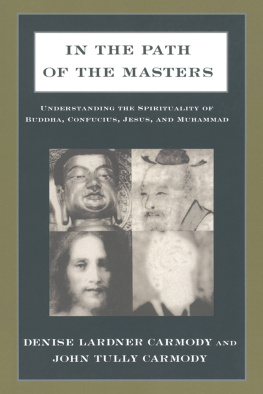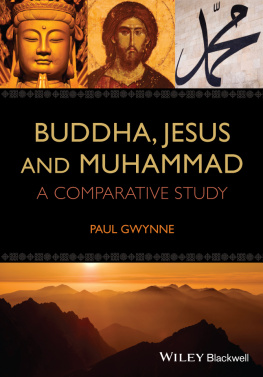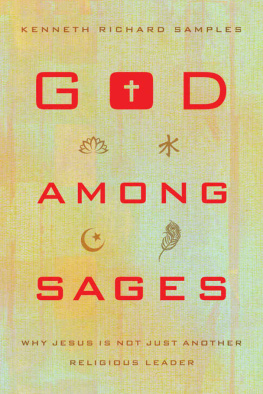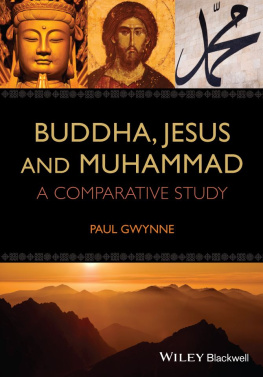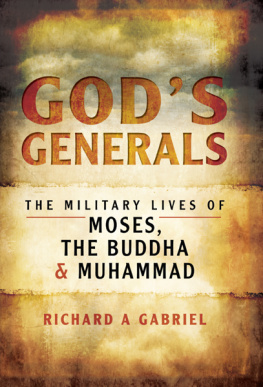IN THE PATH
OF THE
MASTERS
Also by Denise Lardner Carmody
Feminism and Christianity: A Two-Way Reflection
The Oldest God: Archaic Religion Yesterday & Today
Seizing the Apple: A Feminist Spirituality of Personal Growth Women & World Religions
Also by John Tully Carmody
Ecology & Religion: Toward a New Christian Theology of Nature
The Heart of the Christian Matter: An Ecumenical Approach
Holistic Spirituality
Reexamining Conscience
Co-authored books by Denise Lardner Carmody and John Tully Carmody
How to Live Well: Ethics in the World Religions
Peace & Justice in the Scriptures of the World Religions
Shamans, Prophets, & Sages: An Introduction to World Religions
Contemporary Catholic Theology
Exploring American Religion
Republic of Many Mansions: Foundations of American Religious Thought
IN THE PATH
OF THE
MASTERS
Understanding the Spirituality
of Buddha, Confucius,
Jesus, and Muhammad
DENISE LARDNER CARMODY
AND JOHN TULLY CARMODY
University of Tulsa
First published 1994 by M.E. Sharpe
Published 2015 by Routledge
2 Park Square, Milton Park, Abingdon, Oxon OX14 4RN
52 Vanderbilt Avenue, New York, NY 10017
Routledge is an imprint of the Taylor & Francis Group, an informa business
Copyright 1994 Taylor & Francis. All rights reserved.
No part of this book may be reprinted or reproduced or utilised in any form or by any electronic, mechanical, or other means, now known or hereafter invented, including photocopying and recording, or in any information storage or retrieval system, without permission in writing from the publishers.
Notices
No responsibility is assumed by the publisher for any injury and/or damage to persons or property as a matter of products liability, negligence or otherwise, or from any use of operation of any methods, products, instructions or ideas contained in the material herein.
Practitioners and researchers must always rely on their own experience and knowledge in evaluating and using any information, methods, compounds, or experiments described herein. In using such information or methods they should be mindful of their own safety and the safety of others, including parties for whom they have a professional responsibility.
Product or corporate names may be trademarks or registered trademarks, and are used only for identification and explanation without intent to infringe.
Library of Congress Cataloging-in-Publication Data
Carmody, Denise Lardner, 1935
In the path of the masters : understanding the spirituality of Buddha, Confucius, Jesus,
and Muhammad / Denise Lardner Carmody, John Tully Carmody.
p.cm.
Includes bibliographical references and index.
ISBN 1-56324-863-8 (pbk : alk. paper)
1. Spiritual life.
2. Religious biography.
3. Religions.
4. ReligionsRelations.
I. Carmody, John, 1939
II. Title.
BL624.C3471996
291.63dc20
96-11387
CIP
ISBN 13: 9781563248634 (pbk)
CONTENTS
In this book we reflect on the legacy of four great religious figures: the Buddha, Confucius, Jesus, and Muhammad. Billions of people have made their way through life following what these figures taught and exemplified. The four founded some of the most influential religious systems the world has known, and their followers continue to think they furnish the wisdom most precious for determining how to live well.
Our interest is the spiritualities of these great founders. We focus on the existential, personal, experiential aspects of their messages and wisdoms. After situating them in their historical context, we try to glimpse what they were like personally, hear what they taught, and assess both how they saved their followers from confusion and where their legacy may be imperfect, open to friendly criticism.
The result should be an invitation to approach the Buddha, Confucius, Jesus, and Muhammad as great benefactors of humankind. For either academic or personal purposes, the questions these founders generate and the answers they provide can be enormously stimulating. Each points beyond the obvious to the mysteriousthe intriguing foundations of holiness and fulfillment. None backs away from the most challenging of tasks: determining what is realistic, on what human beings can rely, when they seek to ground their lives. So, we believe, each founder remains a great educator. If we can stimulate readers to meditate on the texts and other bequests of these founders, we shall be more than gratified.
Our thanks to Peter Coveny and Jo Glorie of Paragon House, who brought the book to publication.
The Great Religious Founders
When we speak of the great religions, we mean the traditions that have lasted for centuries, shaped hundreds of millions of people, and gained respect for their depth and breadth. In most surveys of the worlds religions, Hinduism, Buddhism, Confucianism, Taoism, Judaism, Christianity, and Islam step forth as candidates for this title. The founders of such traditions may be anonymous, legendary, or historical. For example, the founders of Hinduism were anonymous, inasmuch as the seers (rishis) usually credited with the Vedas have no names. They were legendary inasmuch as sages such as Yajnavalkya, who appears in the Upanishads, and deities such as Krishna, who appears in the Bhagavad-Gita, are mythological more than factual. They were historical inasmuch as one considers the sage Shankara (788820) or the political holy man Mahatma Gandhi (18691948) a founder of native Indian religious traditions.
This raises the question, What do we mean by founder? Here the word will mean a person who launched a comprehensive religiona way of dealing with ultimate reality that expanded to touch all of human culture in the geographical areas where it flourished. In effect, this way of defining the term founder requires that the candidate be a historical figuresomeone we are certain lived in a given period of time, a given geographical space, a given native culture.
One may debate whether any human figure could launch a comprehensive religion. Isnt that something that only God can do? Or, isnt that something at which many human hands would have to labor? In the sense in which we use the term, a single human being can be a founder of a great religion. Such traditions as Buddhism, Confucianism, Christianity, and Islam only came into being through the labors of the Buddha (Gautama), Confucius, Jesus, and Muhammad. Even if we say that many other people shaped Buddhism and Confucianism, it remains true that Gautama and Confucius were the discernible, historical originators of what subsequently became known as Buddhism and Confucianism. Even if we say that God was the reason that Christianity or Islam began, it remains true that Jesus and Muhammad were the prophetic figures who decisively shaped the human beginnings of Christianity and Islam.
Thus far, we have nominated the Buddha, Confucius, Jesus, and Muhammad for inclusion in our study of the spirituality of the great religious founders. Each was a fully historical human being who marked the starting point from which the religion associated with his name began. Even though many of the materials that we must use when studying these four figures are legendary, mythological, or filled with assumptions from religious faith, the figures themselves stand solidly in history. Few if any responsible historians argue that Gautama, Confucius, Jesus, or Muhammad never existed. No one disputes that the religions these men launched have had a momentous impact on history. (In the course of discussing Buddhism and Confucianism, we shall clarify what has been religious about them, and what has not, since some observers do not classify them as religions.) What about Taoism and Judaism? Do they have founders we ought to include?

